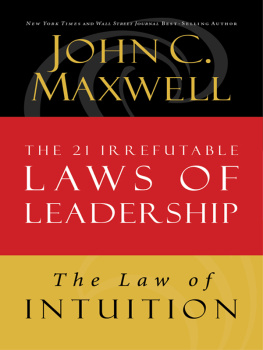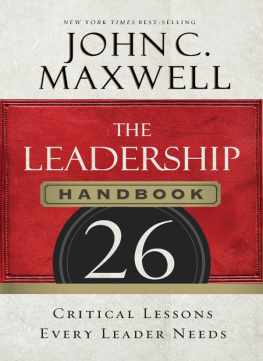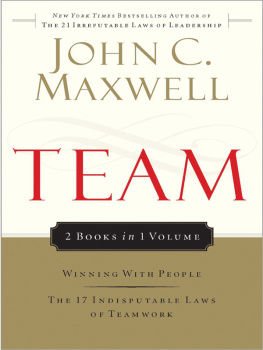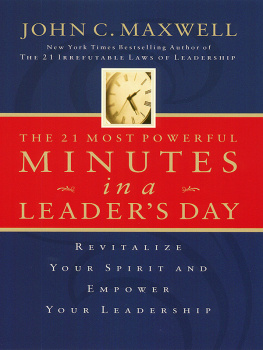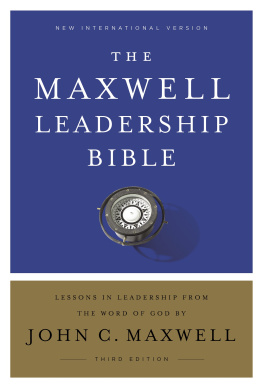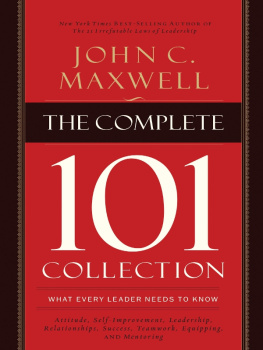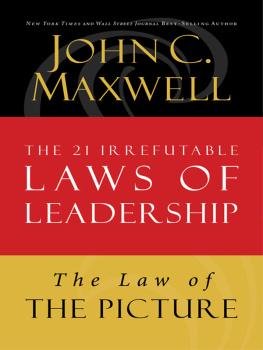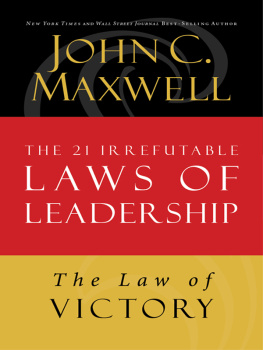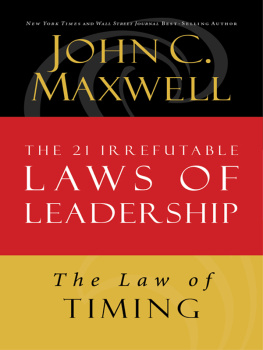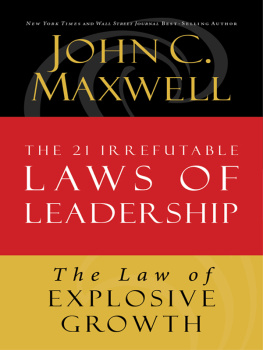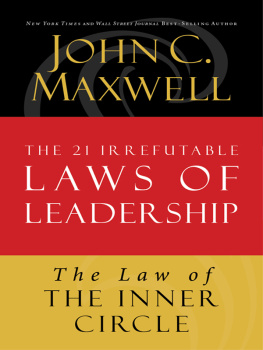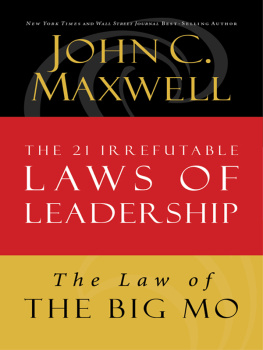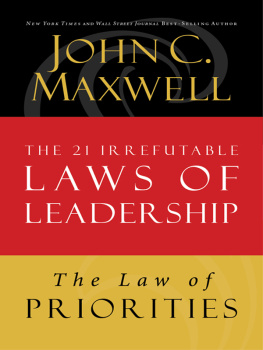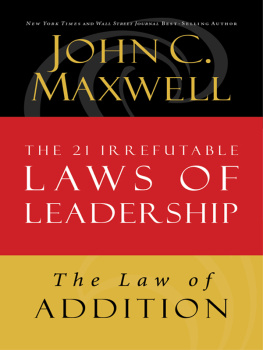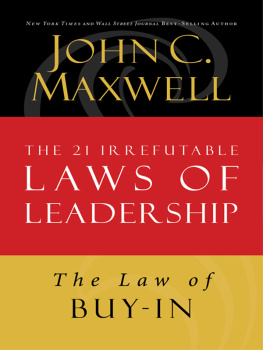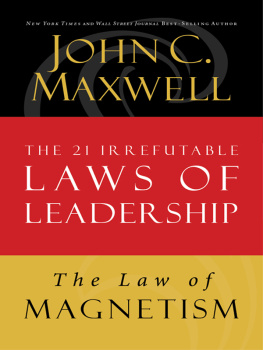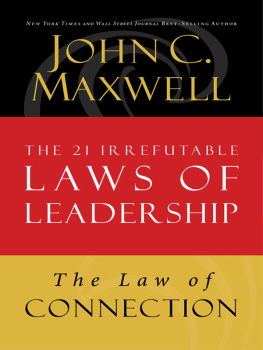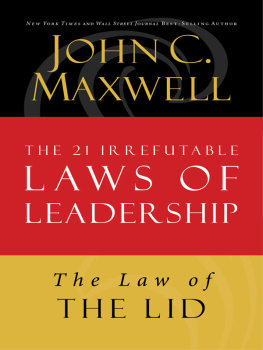
1998 and 2007 by John C. Maxwell
This ebook is derived from The 21 Irrefutable Laws of Leadership, by John Maxwell, 1998 and 2007 by Maxwell Motivation, Inc., a Georgia corporation.
All rights reserved. No portion of this book may be reproduced, stored in a retrieval system, or transmitted in any form or by any meanselectronic, mechanical, photocopy, recording, scanning, or otherexcept for brief quotations in critical reviews or articles, without the prior written permission of the publisher.
Published in Nashville, Tennessee, by Thomas Nelson. Thomas Nelson is a trademark of Thomas Nelson, Inc.
Thomas Nelson, Inc. titles may be purchased in bulk for educational, business, fund-raising, or sales promotional use. For information, please e-mail SpecialMarkets@ThomasNelson.com.
Published in association with Yates & Yates, LLP, Attorneys and Counselors, Orange, California.
Scripture quotations noted CEV are from THE CONTEMPORARY ENGLISH VERSION.
1991 by the American Bible Society. Used by permission.
Scripture quotations noted The Message are from The Message: The New Testament in Contemporary English. 1993 by Eugene H. Peterson.
ISBN 978-0-7852-7431-5 (HC)
ISBN 978-1-4185-3831-6 (ebook)
ISBN 978-1-4002-7567-0 (ebook of Chapter 8)

This book is dedicated to Charlie Wetzel, my writing partner since 1994. Together weve written more than forty books, and Ive enjoyed our collaboration on every one. As I have labored to add value to others by identifying and teaching leadership principles, Charlie, you have added value to me and my efforts. Your insights and skills as a wordsmith have been enjoyed by millions of readers. As a result, you have made a greater impact on more people than has anyone else in my inner circle. For that I thank you.
CONTENTS


Thank you to the thousands of leaders around the world who learned and sometimes challenged the laws of leadership, thus sharpening my thinking.
Thank you to the team at Thomas Nelson who gave me the chance to revise and improve this book, and especially to Tami Heim for her strategic leadership and to Victor Oliver who was instrumental in the development of the original concept.
Thank you to Linda Eggers, my executive assistant, and her assistant, Sue Caldwell, for their incredible service and willingness to go the extra mile every day.
Thank you to Charlie Wetzel, my writer, and Stephanie, his wife, with-out whose work this book would not have been possible.

Leaders Evaluate Everything with a Leadership Bias
During the decade that Ive spoken to audiences about the 21 Laws of Leadership, Ive found that the Law of Intuition is the most difficult to teach. When I talk about it, natural leaders get it instantly, learned leaders get it eventually, and non-leaders just look at me blankly.
Leaders look at things differently than others do. They evaluate everything according to their leadership bias. They possess leadership intuition that informs everything they do. It is an inseparable part of who they are.
EVERYBODY IS INTUITIVE
Not all people are intuitive in the area of leadership, but every person possesses intuition. Why do I say that? Because people are intuitive in their area of strength. Ill give you an example. Because I am a communicator and do a lot of public speaking, people occasionally want to hear from my wife, Margaret, and she receives an invitation to speak at an event. As the date approaches, Margaret works on her presentation and puts together her notes, but we inevitably end up having a conversation something like this:
John, how do you think I should start? she asks.
It depends, I answer.
Thats not much help.
Margaret, Im not trying to be difficult. Every speaking situation is different.
Okay, but what would you do?
Well, Id go out and talk to many of the attendees before the event to try to get a feel for who they areyou know, just check out the room. And Id listen to what the host said and to the people who spoke before me to get an idea if I should play off something they said or that happened earlier. Id find a way to really connect with the audience.
That doesnt help me, she answers in frustration.
To be honest, her questions frustrate me as much as my answers frustrate her. I have a hard time explaining what I would do because communication is intuitive for me; its one of my greatest strengths.
TURNING THE TABLES
Im not picking on Margaret. She is more highly talented than I am in so many areas. To give you an idea, when Im getting ready to speak at an event and Im trying to pick out my clothes, Im worthless. One of two things usually happens: I stand in the closet, paralyzed and drooling, totally incapable of figuring out what goes together. Or I pick something out, put it on, go into the bedroom, and Margaret says, Oh, John, youre not going to wear that, are you?
Uh, I, uh, no, of course not, I answer. What do you think I should wear?
At that, Margaret strolls into the closet and looks around for about two seconds. I havent seen you in this jacket yet, so how about this? she says as she starts grabbing things. And if you wear this shirt and this tie, it will really pop. As she picks the slacks, I try to be helpful and pick out shoes. No, you cant wear those shoes with this, she says. Here, wear these and this belt.
When I am at the event, I hear compliments about how Im dressed, so when I return home, I hang that whole outfit together in the closet because I know it goes together. Then the next time I get ready to leave for a speaking engagement, I put it on and walk confidently into the bedroom. Margaret says, You cant wear that again, and off we go through the whole routine again.
Margaret has incredible instincts when it comes to anything artistic. She has a great sense of style and a fantastic eye for color. She can paint, arrange flowers, design, hunt down fine antiques, garden, decorateyou name it. She is intuitive in the areas of her strengths. Thanks to her, our homes have always been gorgeous. She could easily hold her own against any decorator on HGTV. Im lucky because I benefit from her talent.
MORE THAN FACTS
Intuition is so difficult to explain because its not concrete. It doesnt rely on just empirical evidence. If youve ever seen reruns of the old show Dragnet on TV Land (or if youre my age and saw them when new), you probably know the phrase Jack Webb made famous: Just the facts, maam, just the facts. The Law of Intuition depends on so much more than justthe facts. The Law of Intuition is based on facts plus instinct plus other intangible factors, such as employee morale, organizational momentum, and relational dynamics.
Colin Powell, retired army general and former secretary of state, provides a good explanation of the use of leadership intuition and its importance. He observes that many leaders have trouble if they desire to have an exhaustive amount of data or wait to have all their questions answered before making decisions. Powell says that his practice is to make a Leadership decision after gathering only 40 to 60 percent of the information that can be obtained, and then he uses his experience to make up the difference. In other words, he bases his leadership decisions as much on intuition as on facts. He relies on the Law of Intuition. And that often separates the great leaders from the merely good ones.
Next page
